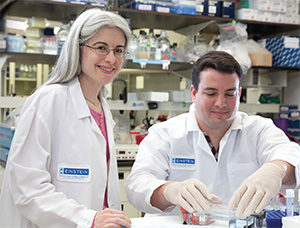

FULL STORY
Disrupting Diabetes With Cellular Strategies
Q: Are both type 1 and type 2 diabetes considered autoimmune diseases?
A: No, only type 1 is an autoimmune disease. In this form of diabetes, an autoimmune attack destroys the pancreas’s insulin-producing beta cells. People with the more common form of diabetes, known as type 2, either don’t make enough insulin or their bodies don’t respond to the insulin that they produce. But in both types, excess blood sugar forms toxic compounds that can damage t

Dr. DiLorenzo and her team, including Ph.D. student Jeffrey Babad, aim to protect insulin-producing beta cells from immunologic attack.Type 1 diabetes happens when the immune system's T cells—which usually defend us against bacteria and viruses—destroy insulin-producing beta cells in the pancreas. Dr. Teresa DiLorenzo, a professor of microbiology & immunology and of medicine (endocrinology), is attempting to stop the destruction at two different cutpoints in the disease's progression.
Neutralizing the Attraction
Using a mouse model of type 1 diabetes, Dr. DiLorenzo and her colleagues identified a protein, IGRP, that juts from the surface of beta cells and that T cells appear to target early in the course of diabetes. IGRP is found only in the pancreas and mainly on beta cells. Moreover, the researchers have identified IGRP's antigen, the key fragment of the IGRP protein that T cells recognize. Dr. DiLorenzo and her team are exploring ways to short-circuit the attraction between T cells and proteins such as IGRP.
The researchers are also looking for ways to manipulate T cells to make them tolerate such beta-cell proteins rather than attack them. The strategy: Kill off the T cells responsible for the immune attack. To help them in this effort, Dr. DiLorenzo and her colleagues have enlisted other immune cells known as dendritic cells.
Converting the Enemy
Dendritic cells normally "tell" T cells which proteins to zero in on when launching an immune attack. To perform this job, dendritic cells swallow a protein, digest it and then present the protein's antigen to the T cells—something like waving a red flag at a bull. Unfortunately, type 1 diabetes occurs when the presented antigen happens to belong to the pancreas's beta cells.
But what if we could fool the dendritic cells—induce them to pass along antigens that would kill the T cells rather than prime them to attack beta cells? Dr. DiLorenzo's laboratory is manipulating dendritic cells to accomplish just that. "We've been able to supply dendritic cells with antigens that wipe out 'bad' T cells—those that destroy beta cells," she says. Since people diagnosed soon after the onset of type 1 diabetes retain about 20 percent of their beta cells, this "tolerizing" early on might halt diabetes in its tracks. And tolerizing immune systems of people at risk for type 1 diabetes (e.g., due to family history) shows great promise in preventing it.
Next: foster the growth of so-called regulatory T cells, which would knock out destructive T cells. And in the far future, we can look to stem cells as possible generators of insulin-producing beta cells.
Dr. DiLorenzo was invested as the first Diane Belfer, Cypres & Endelson Families Faculty Scholar in Diabetes Research at the Einstein Academic Convocation in April.
Posted on: Friday, November 8, 2013

Tablet Blog